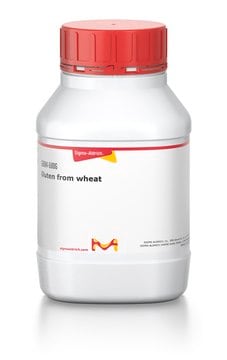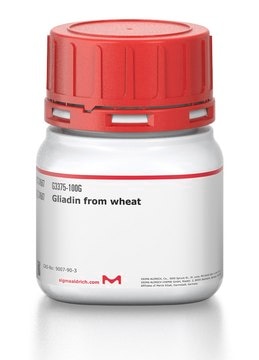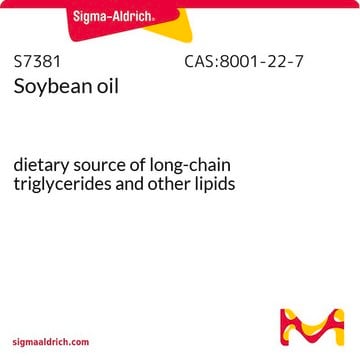S9633
Soybean flour
Type I
Sinonimo/i:
Soy flour, Soybean meal, Soybean protein powder
About This Item
Prodotti consigliati
Origine biologica
Glycine max (soybean)
Tipo
Type I
Forma fisica
powder
Composizione
Protein, ~52% (85+% dispersible and 1% fat.)
applicazioni
microbiology
Cerchi prodotti simili? Visita Guida al confronto tra prodotti
Descrizione generale
Applicazioni
- for optimizing Triton X-114 (TX-114) based lipopolysaccharide (LPS) extraction
- as a protein supplement in the in vitro fermentation of rumen fluid
- as a protein supplement in batch culture of bovine digesta to assess its degradation
Azioni biochim/fisiol
Nota sulla preparazione
Codice della classe di stoccaggio
11 - Combustible Solids
Classe di pericolosità dell'acqua (WGK)
WGK 3
Punto d’infiammabilità (°F)
Not applicable
Punto d’infiammabilità (°C)
Not applicable
Dispositivi di protezione individuale
Eyeshields, Gloves, type N95 (US)
Certificati d'analisi (COA)
Cerca il Certificati d'analisi (COA) digitando il numero di lotto/batch corrispondente. I numeri di lotto o di batch sono stampati sull'etichetta dei prodotti dopo la parola ‘Lotto’ o ‘Batch’.
Possiedi già questo prodotto?
I documenti relativi ai prodotti acquistati recentemente sono disponibili nell’Archivio dei documenti.
I clienti hanno visto anche
Il team dei nostri ricercatori vanta grande esperienza in tutte le aree della ricerca quali Life Science, scienza dei materiali, sintesi chimica, cromatografia, discipline analitiche, ecc..
Contatta l'Assistenza Tecnica.









